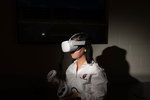Wind: mph,
Welcome to our new web site!
To give our readers a chance to experience all that our new website has to offer, we have made all content freely avaiable, through October 1, 2018.
During this time, print and digital subscribers will not need to log in to view our stories or e-editions.



The New Mexico State University dietetic internship program is the only program that trains students to become registered dietitians in southern New Mexico and southwest Texas, said Paso del Norte Health Foundation (PDNHF), which is providing $96,000 in funding for the program.
“The simulation lab and virtual reality curricula allow students to get real-world training, making the transition between the classroom and the real experience less challenging,” a PDNHF news release said.
PDNHF “gave me the help I needed to make the program recognized nationally, because we have unique opportunities that are not done elsewhere,” said the internship program director, Sylvia "Gaby" Phillips.
NMSU worked with local registered dietitians to help write case studies for the program that mimicked real-life cases interns would likely treat in a clinical setting, the news release said. Students were able to learn with a virtual-reality headset and a mannequin that mimicked human speech. Accessing and manipulating the mannequin virtually during COVID-19, Phillips observed interns’ interaction with the mannequin, which helped bridge the gap between school and real-life clinicals, PDNHF said.
“What we're doing now is basically expanding what I started with the partnership of PDNHF with a new federal grant in collaboration with another university on the East Coast,” Phillips said. “I think virtual reality and simulation are going to be the future of healthcare education.”
“Registered dietitians are important in providing healthcare support and services in our community,” Phillips said, “but also, as we see many chronic diseases increase in our region. Registered dietitians will play a role as well in the prevention side.”
Trained in food restrictions, eating habits and meal planning, they can be especially helpful to people suffering from pre-diabetes, diabetes and obesity, PDNHF said.
The American Diabetes Association estimates 12.3 percent of New Mexico adults – more than 200,000 people – have diabetes. The ADA estimates another 53,000 people in the state have diabetes and don’t know it, and another 587,000 New Mexicans have prediabetes, with blood glucose levels that are higher than normal. (Visit https://diabetes.org/sites/default/files/2021-11/ADV_2021_State_Fact_sheets_New%20Mexico_rev.pdf.)
“It is important to not only prevent diabetes through healthy eating programs but to also provide management and treatment in a clinical setting,” the news release said.
Since 2011, the dietetic internship program has educated about 12 cohorts of new registered dietitians/registered dietitian nutritionists. In 2023, the program will celebrate 10 years of certifying graduate students/dietetic interns who are eligible to take the national registered dietitian exam.
PDNHF was created in 1955 to ensure people living in far west Texas, southern New Mexico and Ciudad Juárez, Mexico have the knowledge, resources and skills to lead healthy lives.
Visit www.pdnhf.org.